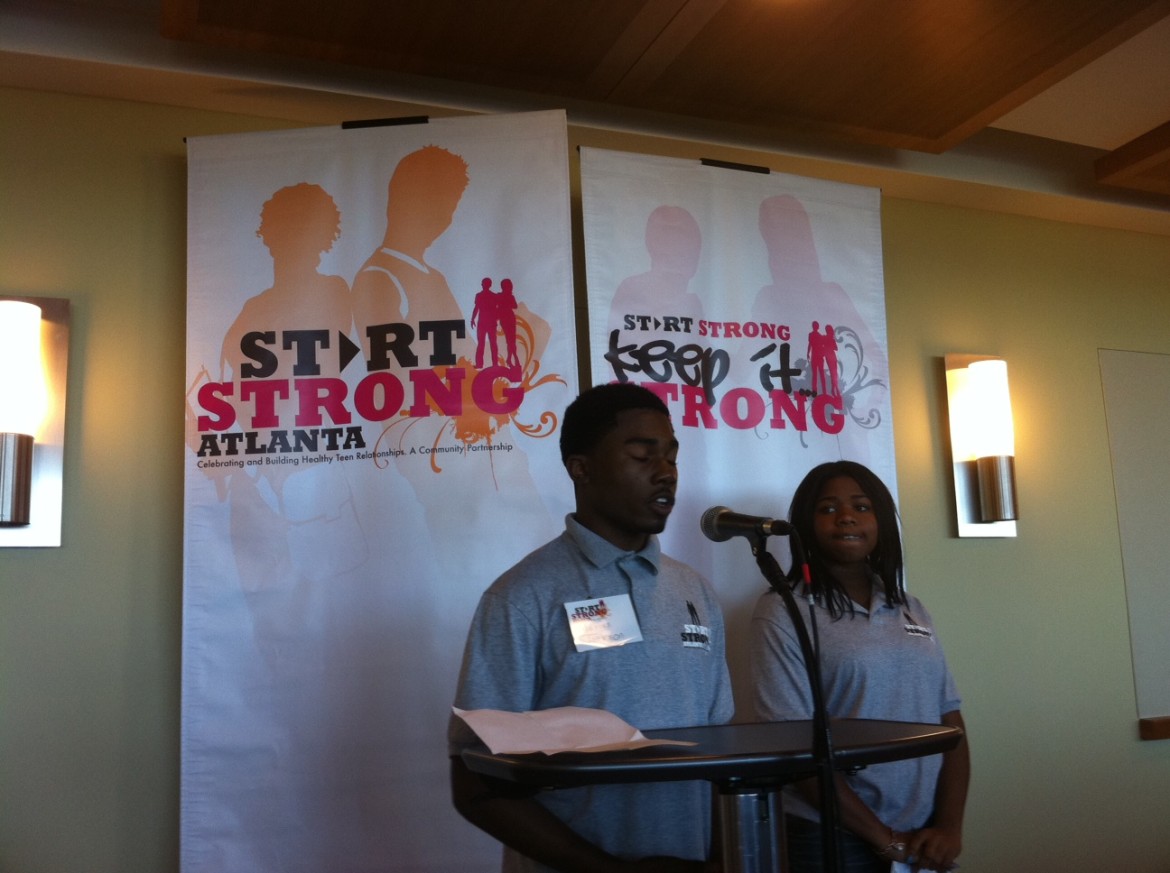 Sometimes the solution to a very big problem is to prevent it from occurring in the first place. That’s the theory behind Start Strong, a national program designed to defeat teen-dating violence by helping middle-school kids learn how to avoid unhealthy relationships.
Sometimes the solution to a very big problem is to prevent it from occurring in the first place. That’s the theory behind Start Strong, a national program designed to defeat teen-dating violence by helping middle-school kids learn how to avoid unhealthy relationships.
“I didn’t even know I was in an abusive relationship,” says Nija Nelson, who says her former boyfriend yelled at her and called her names. “Most teens don’t recognize the other kinds of abuse besides physical abuse. Start Strong helped me realize that the relationship I was in was unhealthy.”
Now, Nija is an Atlanta high school senior and a Start Strong “Youth Leader” who talks to middle school kids about teen-dating violence. She told her story to staff members from 11 Start Strong programs, who came to Atlanta this week from across the country to train each other, to share successes and to figure out how to replicate their most exciting innovations. And some innovations do seem pretty, well, innovative: There’s the “Healthy Relationships” merit badge developed by Start Strong LA in cooperation with the Girl Scouts. There’s a video game being developed by Start Strong Rhode Island, a middle school writing contest in Idaho, and even a “Break-up Summit” developed in Boston. See our photo gallery on Start Strong innovations.
A very simple idea lies behind each of those efforts: Before they get into high school relationships that can lead to violence, middle school students can benefit by learning more about building healthy relationships.
“The first approaches [to finding solutions] in general are in the place where the problem occurs,” says Laura Hogan, Start Strong’s national co-director. “But as you work in the field you start to ask yourself, ‘How could we have prevented it?’”
For date rape and other dating-related violence, it makes sense to turn the clock back to middle school, where “people are just beginning to explore relationships,” Hogan says. The reasons run even deeper than social pressures: Hogan stresses that recent neurological research shows that the human brain forms lasting patterns of thinking about romantic relationship in the pre-teen years.
And then once they get a little older, the problems inherent in having a poor understanding of healthy relationships manifest themselves in a big way. According to the CDC’s 2009 Youth Risk Behavior Survey of 16,410 public and private high school students, nearly one in 10 reported being victims of physical violence at the hands of a romantic partner during the previous year.
So three years ago, leaders at the Robert Wood Johnson Foundation decided to tackle the problem at the source. The foundation would grant $1 million to each of 10 community organizations across the country to spend four years developing and implementing innovative ways to prevent date rape and other teen violence by working with pre-teens. The Blue Shield of California Foundation agreed to fund an 11th program in California. And the Robert Wood Johnson Foundation hired Hogan’s organization, Futures Without Violence, to oversee them.
They decided to focus on four areas: Educating kids inside and outside their schools; engaging such “teen influencers” as parents, teachers and older teenagers; working with school systems to adopt policies that help; and implementing communications and social marketing strategies.
Organizations in more than 400 communities applied for a piece of the pie. Spreading $1 million over the course of four years may seem like a drop in the bucket toward solving such a massive problem. Hogan stresses, however, that each of the 11 proposals selected was tied to a larger organization that could leverage the money.
In Atlanta, for example, the grant recipient is the Emory University Jane Fonda Center, which has partnered with the Atlanta Public Schools and Grady Health System.
During a break in all the policy talk at this week’s meeting, two Start Strong Atlanta Youth Leaders -- Nija and another Atlanta high school student, Marius Jackson — shared their own stories. Neither had been involved in Start Strong when they were in middle school because the program didn’t exist yet.
But Marius went through training last summer to become a Start Strong leader. When he returned to school in September, he noticed that a friend had cut marks on her arms.
“I asked her what that was from, and she trusted me enough to tell that she was cutting herself,” Marius said in a separate interview. He said his friend’s boyfriend was making her feel bad about herself. “I sat her down and talked to her to explain it didn’t have to be like that.
“I do think I got through to her,” Marius said. But it wasn’t easy, and his friend, Marius laments, is still in that relationship.
Nija already had broken up with her verbally-abusive boyfriend before she got involved with Start Strong. But she realized through the program that the verbal abuse she underwent amounted to a form of violence.
Now, she regularly offers her own insights to middle students, and she’s optimistic that it’s working.
“The information that we’ve given them -- they may not get it right then,” Nija says. “But it’ll be there for them, and maybe they’ll get it later.”
